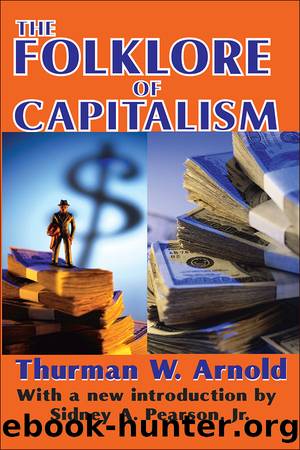The Folklore of Capitalism by Reeve Robert Brenner

Author:Reeve Robert Brenner [Brenner, Reeve Robert]
Language: eng
Format: epub
Tags: Public Policy, Political Science, General, Economic Policy
ISBN: 9781351482707
Google: HSEuDwAAQBAJ
Goodreads: 35865143
Publisher: Routledge
Published: 2017-07-12T00:00:00+00:00
CHAPTER VIII
The Personification of Corporation
IN which it is explained how great organizations can be treated as individuals, and the curious ceremonies which attend this way of thinking.
ONE of the essential and central notions which give our industrial feudalism logical symmetry is the personification of great industrial enterprise. The ideal that a great corporation is endowed with the rights and prerogatives of a free individual is as essential to the acceptance of corporate rule in temporal affairs as was the ideal of the divine right of kings in an earlier day. Its exemplification, as in the case of all vital ideals, has been accomplished by ceremony. Since it has been a central ideal in our industrial government, our judicial institutions have been particularly concerned with its celebration. Courts, under the mantle of the Constitution, have made a living thing out of this fiction. Men have come to believe that their own future liberties and dignity are tied up in the freedom of great industrial organizations from restraint, in much the same way that they thought their salvation in the future was dependent on their reverence and support of great ecclesiastical organizations in the Middle Ages. This ideal explains so many of our social habits, rituals, and institutions that it is necessary to examine it in some detail.
The origin of this way of thinking about organization is the result of a pioneer civilization in which the prevailing ideal was that of the freedom and dignity of the individual engaged in the accumulation of wealth. The independence of the free man from central authority was the slogan for which men fought and died. This free man was a trader, who got ahead by accumulating money. There was something very sacred in the nineteenth-century conception of this activity. In the âseventies the most popular text in economics was one originally written by a clergyman, Bishop Francis Way land, and revised in 1878 by A. L. Chapin, President of the Congregational College at Beloit. Joseph Dorfman, in his brilliant book on Thorstein Veblen and His America,1 summarizes this philosophy of the holy character of the traderâs function as follows:
1) âGod has made man a creature of desiresâ and has established the material universe âwith qualities and powers . . . for the gratification of those desiresâ Desire is the stimulus to production and invention. 2) To satisfy desires, to obtain pleasures, man must by âirksomeâ labour force ânature to yield her hidden resources!â 3) The exertion of labour establishes a right of PROPERTY in the fruits of labour, and the âidea of exclusive possession is a necessary consequence.â Originally the object belongs to the producer âby an intuitive conception of right, and the act of appropriation is as instinctive as the act of breathing.â The right of property may be conceived as âa law of natural justice,â as Bowen of Harvard put it, because âthe producer would not put forth his force and ingenuity if others deprived him of their fruits.â Thus is established 4) âThe Right of EXCHANGE.
Download
This site does not store any files on its server. We only index and link to content provided by other sites. Please contact the content providers to delete copyright contents if any and email us, we'll remove relevant links or contents immediately.
International Integration of the Brazilian Economy by Elias C. Grivoyannis(99713)
The Radium Girls by Kate Moore(11978)
Turbulence by E. J. Noyes(7983)
Nudge - Improving Decisions about Health, Wealth, and Happiness by Thaler Sunstein(7662)
The Black Swan by Nassim Nicholas Taleb(7065)
Rich Dad Poor Dad by Robert T. Kiyosaki(6522)
Pioneering Portfolio Management by David F. Swensen(6261)
Man-made Catastrophes and Risk Information Concealment by Dmitry Chernov & Didier Sornette(5959)
Zero to One by Peter Thiel(5737)
Secrecy World by Jake Bernstein(4706)
Millionaire: The Philanderer, Gambler, and Duelist Who Invented Modern Finance by Janet Gleeson(4427)
The Age of Surveillance Capitalism by Shoshana Zuboff(4253)
Skin in the Game by Nassim Nicholas Taleb(4208)
Bullshit Jobs by David Graeber(4145)
The Money Culture by Michael Lewis(4143)
Skin in the Game: Hidden Asymmetries in Daily Life by Nassim Nicholas Taleb(3964)
The Dhandho Investor by Mohnish Pabrai(3729)
The Wisdom of Finance by Mihir Desai(3700)
Blockchain Basics by Daniel Drescher(3544)
